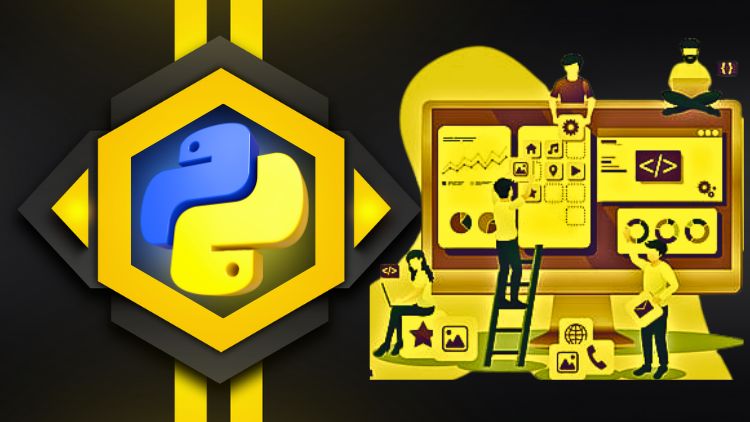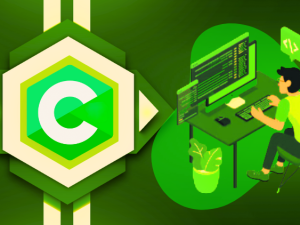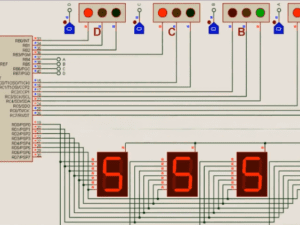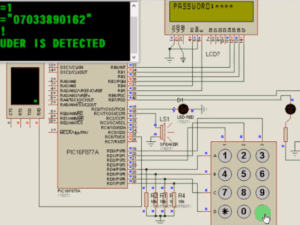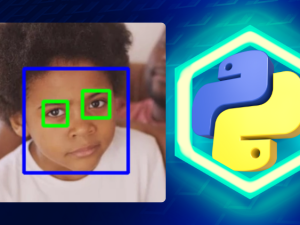100 Python Programming Practices/Common Projects to Improve Your Coding Skill
- Description
- Curriculum

Unlock the world of programming with “100 Python Programming Practices/Common Projects to Improve Your Coding Skill.” Designed for beginners, this comprehensive course will guide you through the foundational concepts of Python, helping you to develop practical coding skills through hands-on projects. Whether you’re a complete novice or looking to solidify your programming knowledge, this course is tailored to provide you with a robust learning experience.
What You Will Learn:
-
Basic Number Operations:
- Detect Positive and Negative Numbers: Learn how to classify and work with different types of numbers.
- Check for Even and Odd Numbers: Master techniques to identify and handle even and odd numbers.
- Greatest of 3 Numbers: Compare and determine the largest number among three inputs.
- Divisibility Check: Develop methods to check if one number is divisible by another.
-
Temperature Conversion:
- Celsius to Fahrenheit & Fahrenheit to Celsius: Understand temperature conversion with practical applications.
- Create a Simple Thermometer: Apply your knowledge to build a basic thermometer application.
-
Physics and Geometry:
- Calculate Mass, Density, and Volume: Use Python to solve fundamental physics problems.
- Determine Quadrant of a Point: Identify the location of points in a coordinate system.
- Triangle Existence & Leap Year Check: Solve basic geometric and date-related problems.
-
Mathematical Operations:
- Quadratic Equations: Create and solve quadratic equations.
- Random Number Queues & ASCII Table: Work with random numbers and ASCII values.
- Multiplication Tables: Generate multiplication tables using while and for loops.
- Base Conversions: Convert numbers between different bases (2 to 9).
-
Building a Calculator:
- Simple Calculator: Develop a basic calculator to perform arithmetic operations.
- Number Operations: Count digits, find the sum and product of digits, and perform binary searches.
-
Series and Sequences:
- Sum of N Series & Factorials: Calculate series sums and factorials using loops.
- Fibonacci Sequence: Generate and find values in the Fibonacci sequence.
-
Prime and Complex Numbers:
- Prime Number Detection: Identify prime and complex numbers.
- Quadratic Equations: Solve quadratic equations within specified ranges.
-
String Manipulation:
- Expand and Replace Substrings: Perform various string operations, including replacing substrings and expanding strings.
- Sort Words and Find Longest Word: Work with strings to sort words and find the longest word.
- Palindrome Check: Determine if a string is a palindrome.
-
Array and List Operations:
- Generate Random Numbers: Create arrays with random numbers.
- Find Maximum and Minimum Elements: Identify the largest and smallest elements in arrays.
- Sort and Intersect Lists: Perform sorting and find intersections between lists.
- Matrix Operations: Sum items, sort columns, and work with matrix diagonals.
-
File Handling:
- Read and Write Files: Master file operations including reading, writing, and counting lines, words, and letters.
- Error Handling: Capture and handle various errors, including file and division errors.
-
Advanced Topics:
- Classes and Constructors: Use classes to create and manage objects in Python.
- Recursive Functions: Implement recursion for calculating Fibonacci sequences and factorials.
- LCM and GCD: Calculate the least common multiple and greatest common divisor.
-
Scientific Calculations:
- Orbital Speed and Geometric Calculations: Apply Python to solve real-world scientific problems.
In this course, you will master essential Python programming concepts by working on 100 diverse projects, ranging from simple to complex. Each project is designed to enhance your understanding of Python and improve your problem-solving skills. Here’s a sneak peek into what you’ll learn:
- Basic Number Operations: Detect positive and negative numbers, check for even and odd numbers, and determine the greatest of three numbers.
- Temperature Conversion: Convert between Celsius and Fahrenheit, and create a simple thermometer application.
- Physics Calculations: Calculate mass, density, and volume, and determine the quadrant of a point.
- Geometry: Check if a triangle exists, determine if a point belongs to a circle, and solve quadratic equations.
- Random Number Generation: Make queues of random numbers and generate random numbers using arrays.
- Multiplication Tables: Create multiplication tables using both while and for loops.
- Base Conversions: Convert numbers between different bases (2 to 9).
- Simple Calculator: Build a basic calculator to perform arithmetic operations.
- Digit Operations: Count the number of digits in an integer, sum and product of digits, and perform binary search in an array.
- Series and Sequences: Calculate the sum of N series, generate Fibonacci sequences, and find the greatest common divisor (GCD).
- Prime and Complex Numbers: Identify prime and complex numbers, and solve quadratic equations with specified coefficient ranges.
- String Operations: Expand strings, replace substrings, select integers from strings, sort words by length, and find the longest word.
- Array Manipulations: Reverse numbers, generate random matrices, and perform bubble and selection sorting.
- File Handling: Read and write to files, count lines, words, and letters, and handle file extensions and errors.
- Data Structures: Work with lists, dictionaries, and matrices. Create and manipulate complex data structures.
- Error Handling: Capture and handle string errors, division by zero, index out of bounds, and raise exceptions.
- Class and Object-Oriented Programming: Use classes, constructors, and methods to build robust Python applications.
- Mathematical Calculations: Calculate the area and perimeter of geometric shapes, surface area of cylinders, and more.
- Advanced Topics: Work on projects involving orbital speed, ring shifts, and more advanced mathematical and scientific calculations.
Why Enroll in This Course?
- Comprehensive Curriculum: Gain practical experience with 100 diverse and engaging projects.
- Beginner-Friendly: Designed specifically for beginners, with step-by-step guidance and clear explanations.
- Practical Learning: Apply your knowledge through hands-on projects that simulate real-world scenarios.
- Skill Enhancement: Improve your coding skills, problem-solving abilities, and understanding of Python.
- Flexible Learning: Learn at your own pace with lifetime access to course materials and projects.
Join “100 Python Programming Practices/Common Projects to Improve Your Coding Skill” today and take the first step towards becoming a proficient Python programmer. Whether you’re starting a new career in tech or looking to enhance your programming skills, this course is your gateway to success. Enroll now and start coding with confidence!
-
2How to detect Positive and Negative Numbers4:15 mins
-
3How to check for Even and odd Numbers4:27 mins
-
4How to check for Greatest of 3 Numbers4:27 mins
-
5How to check for divisibility of a Number3:36 mins
-
6How to convert from Celsius to Fahrenheit3:17 mins
-
7How to convert from Fahrenheit to Celsius3:41 mins
-
8How to create a simple Thermometer7:39 mins
-
9How to calculate Mass, Density and Volume8:28 mins
-
10How to determine the quadrant of a point7:48 mins
-
11How to determine if a Triangle exist6:07 mins
-
12How to check for Leap year3:04 mins
-
13How to check if a point belongs to Circle6:03 mins
-
14How to create quadratic Equation9:36 mins
-
15How to make guess of Random number9:01 mins
-
16How to print out the ASCII Table2:16 mins
-
17How to create a Multiplication Table using while loop3:36 mins
-
18How to create Multiplication Table using for loop2:14 mins
-
19How to convert from base 2 to 94:45 mins
-
20How to build a simple Calculator12:16 mins
-
21Number of digits in an Integer3:12 mins
-
22How to get Sum and Product of digits5:19 mins
-
23How to make a Binary search of number in an array12:05 mins
-
24How to sum of N series of an element5:11 mins
-
25How to get value of Even and Odd digits4:53 mins
-
26How to get a Factorial using a while loop2:48 mins
-
27How to get Factorial using for loop3:51 mins
-
28How to create a Fibonacci Sequence4:03 mins
-
29How to get the value of Fibonacci Element5:12 mins
-
30How to get find the Greatest Common Divisor4:38 mins
-
31How to maximum value of a floating-point number7:35 mins
-
32How to get Prime and Complex Numbers8:03 mins
-
33Quadratic Equation with Solutions at specified Range of Coefficient12:05 mins
-
34How to Reverse Numbers5:09 mins
-
35How to expand Strings of Alphabet4:03 mins
-
36How to Replace a Substring of a String6:47 mins
-
37How to select Integers from String9:01 mins
-
38How to sort words according to their length8:53 mins
-
39How to find the longest word in a String4:41 mins
-
40How to get Percentage of Uppercase and Lowercase5:20 mins
-
41How to check for String Palindrome3:42 mins
-
42How to generate Random numbers using Arrays3:58 mins
-
43How to get the Maximum Element in an Array4:52 mins
-
44How to get the Minimum Element in an Array4:22 mins
-
45How to get the Number of Even and Odd numbers4:40 mins
-
46How to get Positive numbers out of Negative Numbers5:58 mins
-
47How to get numbers greater than the average of an Array6:06 mins
-
48How to Replace list-items with -1, 0, 15:34 mins
-
49How to check for File Extension5:38
-
50How to remove symbols from Text8:23 mins
-
51How to get Intersection of list using for loop2:54 mins
-
52Simple Intersection of List2:32 mins
-
53Longest ordered sequence in ascending order7:38 mins
-
54How to get the most occurrence Element7:19 mins
-
55How to bubble sort elements of an Array5:12 mins
-
56How to sort Array using Selection sorting6:25 mins
-
57How to generate Matrix of Random numbers4:32 mins
-
58How to get the rows and columns with maximum sum of elements10:47 mins
-
59Sum items in rows and columns of elements9:04 mins
-
60How to sum diagonals of a Matrix7:10 mins
-
61How to interchange the principal diagonals of matrix7:34 mins
-
62How to sort columns of element by sorting the first row8:14 mins
-
63How to check rows and columns that has particular element11:59 mins
-
64How to generate beautiful Unicode5:03 mins
-
65How to get prices of products8:22 mins
-
66How to make list of dictionary using 2 Lists3:58 mins
-
67How to delete dictionary item2:56 mins
-
68Return value of 2 Arguments using function4:18 mins
-
69How to fill List6:06 mins
-
70How to get the Arithmetic mean of a List7:03 mins
-
71How to generate Fibonacci sequence using Function4:43 mins
-
72How to get Fibonacci value using recursion3:11 mins
-
73How to get Factorial using recursion2:46 mins
-
74How to get the LCM4:33 mins
-
75How to Reverse Word Sequence3:27 mins
-
76How to search for Binary numbers8:21 mins
-
77How to make a ring shift or recycle items of a list6:13 mins
-
78How to Read Text5:57 mins
-
79How to use Read Method5:02 mins
-
80How to use ReadLine Method5:23 mins
-
81How to use ReadLines Method2:56 mins
-
82How to Write to File8:27 mins
-
83How to Read Text from File to Dictionary9:08 mins
-
84How to count Number of Lines, Words and Letters in a text file8:07 mins
-
85How to capture String Errors4:13 mins
-
86How to check for non existence of number4:21 mins
-
87How to display Error message for non existed files5:29 mins
-
88How to get Division by Zero error3:39 mins
-
89How to get Index out of Exception5:49 mins
-
90How to Raise Exceptions3:57 mins
-
91How to use classes and constructor7:37 mins
-
92How to fill a list with natural Numbers2:04 mins
-
93How to fill a list with Random Numbers4:23 mins
-
94How to select Even Numbers from list2:44 mins
-
95How to create List from Dictionary2:28 mins
-
96How to unpack Matrix into one level list1:55 mins
-
97Read Data from file into Lines and Characters3:14 mins
-
98How to calculate the Orbital speed4:50 mins
-
99Sum of a Random of 3-digit numbers4:35 mins
-
100How to calculate the Area and Perimeter of Right Angle Triangle5:26 mins
-
101How to get Total Surface Area of a Cylinder4:16 mins
